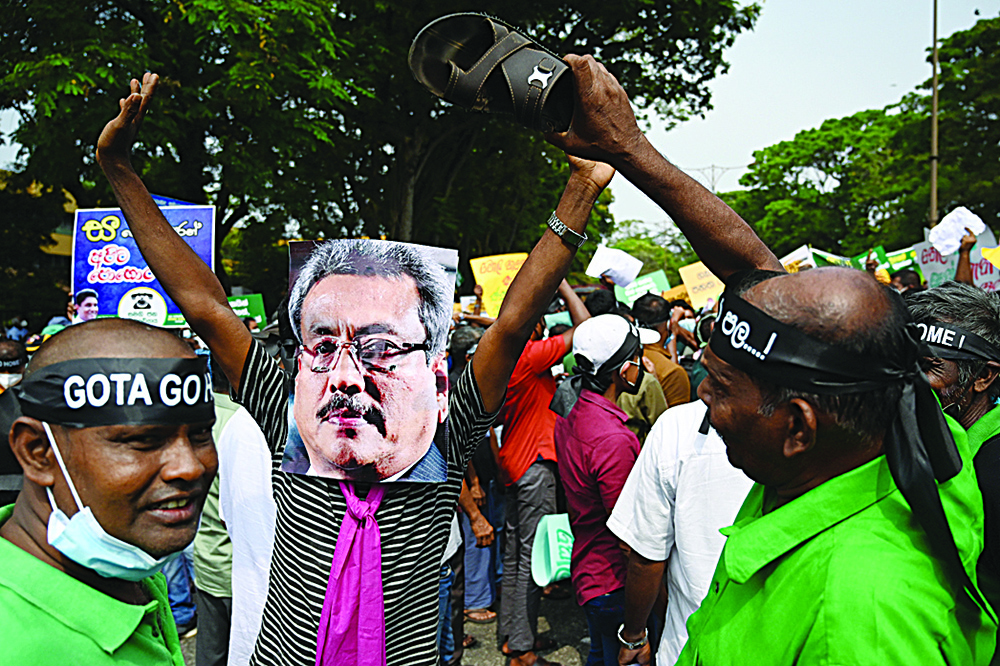COLOMBO: Cash-strapped Sri Lanka has secured a billion-dollar credit line from India to buy urgently needed food and medicine, officials said Friday, as the IMF confirmed it would discuss a possible bailout. The South Asian nation is suffering its worst economic crisis since independence in 1948, with crippling shortages of essentials and fears it will default on its foreign debt or ask bondholders to take a "haircut" on repayments.
India and Sri Lanka formally entered into the credit agreement on Thursday during Finance Minister Basil Rajapaksa's visit to New Delhi, Treasury Secretary Sajith Attygalle told reporters in Colombo. "India stands with Sri Lanka," Indian Foreign Minister S Jaishankar said on Twitter. "$1 billion credit line signed for supply of essential commodities." The latest loan was on top of another $500-million Indian credit line to help its island neighbor buy oil.
Meanwhile, the International Monetary Fund on Friday confirmed it was considering President Gotabaya Rajapaksa's surprise Wednesday request to discuss a bailout. "We will discuss with the authorities how best we can assist Sri Lanka going forward," IMF spokesman Gerry Rice said in a statement to reporters in the capital. Rajapaksa's announcement that he would go to the IMF-a U-turn from his previous position-increases the likelihood that Sri Lanka will seek to renegotiate some of its estimated $51 billion in foreign debts. Rice said the IMF had already highlighted the urgent need for Sri Lanka to implement a "credible and coherent strategy to restore macroeconomic stability and debt sustainability."
Around $6.9 billion of Colombo's debt needs to be serviced this year. Its foreign currency reserves stood at about $2.3 billion at the end of February. Sri Lanka earlier this year asked one of its main creditors, China, to help put off debt payments, but there has been no official response yet from Beijing.
Sri Lanka's tea crop suffered its lowest yield in 13 years, official data showed Friday, reducing output in its main export commodity as the island grapples with its worst economic crisis in seven decades. The country's agriculture sector was hit hard by a ban on agrochemicals imposed last April as the government introduced an ambitious plan to make Sri Lanka the world's first nation to rely solely on organic farming.
The ban was lifted by October following backlash from the industry but farmers were left unable to access imported fertiliser as the country simultaneously ran out of dollars to finance imports with the pandemic battering Sri Lanka's tourism sector. "What we are seeing today is a self-inflicted wound on the tea industry," a senior tea broker at the Colombo Tea Traders' Association told AFP.
Monthly tea crops dropped to 18.16 million kilos (39.95 million pounds) in February, down nearly 20 percent from the corresponding period last year, the Sri Lanka Tea Board figures showed. "This is the lowest crop for the month since 12.8 million kilos were recorded in 2009," broking firm Asia Siyaka said. The government has said an unprecedented shortage of food, fuel and medicines is due to the collapse of its foreign reserves. Tea exports brought in $1.3 billion annually before the fertilizer ban. Industry officials added that around 10 percent of Sri Lanka's exports had also been affected by Russia's invasion of Ukraine. Both countries are top buyers of Sri Lanka's aromatic black tea. - AFP











